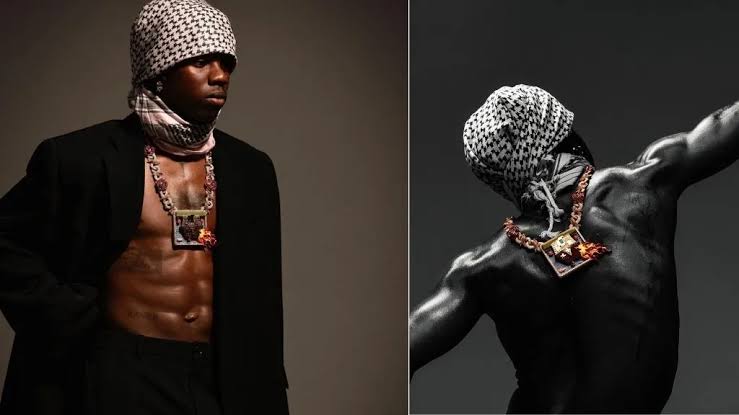Entertainment
Ethiopian Orthodox Church Cancels Rema’s Concert

The Ethiopian Orthodox Tewahedo Church has allegedly influenced the Sheraton Hotel in Addis Ababa to cancel the scheduled September 9, 2023 concert of Nigerian afrobeats sensation, Divine Ikubor, known as Rema.
During an interview with Nigerian media personality Daddy Freeze, an Ethiopian woman revealed that the hotel management canceled the concert after influential leaders of the Ethiopian Orthodox Church accused Rema, of being a “devil worshipper” due to his customized necklace.
In the promotional artwork for the concert, Rema was depicted wearing a customized necklace adorned with imagery of a burning church and inverted crosses.
She said, “They made a statement, like a press release in Ethiopia about Rema. Yes, you can imagine, it’s a very big deal.
“They’re basically saying he is worshipping the devil because of what he has on his neck. And to be honest, I never thought of it myself. And there’s more to it; to be honest.”
In a video circulating on social media, a woman was captured vandalizing Rema’s concert poster in Addis Ababa.
Entertainment
Having A Child Out Of Wedlock Once Ended Careers – D’banj Laments Shifts In Celeb Norms
Nigerian singer and rapper, Oladapo Daniel Oyebanjo better known as D’banj has noted that, unlike his generation where having a child out of wedlock could end a showbiz person’s career, celebrities are now being celebrated for having children out of wedlock.
The ‘koko-master, spoke on Moral Differences Between His Generation and Current Musicians in a recent interview with The Beat FM, Lagos.
Music star D’banj discussed the contrasting moral landscape between his generation of musicians and the current crop of artists.
Reflecting on the past, the ‘Koko Master’ noted that having a child out of wedlock was once a career-ending scandal, citing the experiences of his colleague 2Baba. Today, he observes a shift in societal attitudes, with celebrities now being celebrated for the same situation.
D’banj shared a lighthearted exchange with 2Baba, jokingly chiding him for not encouraging a similar path. The musician’s observations highlight the evolving social mores within the Nigerian music scene and broader cultural shifts in how personal lives of celebrities are perceived and embraced.
Speaking in an interview with The Beat FM, Lagos, the Koko Master said, “Our generation was so hard. If you had a child out of wedlock, your career could just end. But now everybody is just embracing it.
“I am angry. Sometimes I call 2Face to chide him for not encouraging me back then because it is something different when you now see them celebrating with their kids. They are in their 30s and their kids are teenagers.
“But I think it goes beyond people, it goes to your state of mind: Are you mentally and financially ready? You don’t have to have everything in the world, if you’re ready to embrace what is coming to you, I think that is the best.”
Entertainment
FG’s Ban On Smoking, Ritual Scenes In Films Divide Nollywood Stakeholders Views

The Federal Government’s recent move to enforce a prohibition on smoking, money rituals, and ritual killings in Nigerian films has sparked a contentious debate within the Nollywood community.
The announcement, made by Dr. Shaibu Husseini, Executive Director of the National Film and Video Censors Board (NFVCB), aims to curtail the glamorization of such acts in movies, musical videos, and skits, under a new regulation approved by the Minister of Arts, Culture, and Creative Economy, Hannatu Musawa.
During a national stakeholders’ engagement on smoke-free Nollywood in Enugu, Dr. Husseini emphasized that the regulation seeks to discourage harmful content and promote positive values, particularly for teens and young adults who form a significant portion of the Nigerian movie audience.
The NFVCB plans to implement extensive educational programs across schools, communities, and faith-based groups to highlight the dangers of smoking and the negative influence of ritualistic scenes.
However, the policy has received mixed reactions from industry stakeholders. Veteran actor Bob Manuel Udokwu supports the government’s move, explaining that it is not an outright ban but a measure to prevent inadvertent promotion of smoking and ritual acts. He believes that filmmakers can still depict such scenes when necessary for storytelling, such as in documentaries or true-life stories.
Conversely, actress Jennifer Obodo criticises the government for focusing on Nollywood instead of addressing pressing national issues like high fuel prices, food shortages, and poor infrastructure.
She argues that movies are a form of storytelling and that banning these elements does not address the root of the problem, suggesting that the government should instead regulate cigarette production and sales.
Ngozi Eze Evuka, another actress, argues against the ban, stating that movies educate and entertain rather than corrupt viewers. She fears that banning smoking and ritual scenes could lead to further restrictions on other narrative elements in Nollywood, such as sexual acts and depictions of traditional practices.
Nollywood producer Nnaemeka Charles Eze (Nani Boi) also opposes the ban, suggesting it distracts from more critical national issues and could stifle creative expression. He proposes that an oversight body should ensure films meet ethical standards without compromising artistic freedom.
Despite the opposition, some, like Nelson Bright, view the ban positively, linking it to broader efforts to combat human trafficking and illegal organ harvesting. Nonetheless, he acknowledges that such restrictions could limit personal liberty and drive filmmakers away from the Nigerian cinema industry, potentially impacting its international recognition and profitability.
Don Sylvester Nweke, CEO of Don Sylvester Records, believes the ban is unnecessary and suggests that films should instead depict the negative consequences of smoking and rituals to educate viewers. He argues that censorship should focus on ensuring films convey moral lessons rather than outright banning content.
Maxi Okwu, former National Chairman of APGA, raises constitutional concerns, emphasizing the need to protect fundamental rights to freedom of thought, conscience, and religion. He warns that the ban might infringe on these rights and suggests that any law limiting such freedoms would require constitutional amendments.
As Nollywood grapples with this contentious regulation, the debate underscores the delicate balance between artistic freedom and social responsibility in the film industry.
Entertainment
‘Everybody Needs To Have A Pinch Of Portable In Them’ – D’banj
Nigerian singer and rapper, D’banj has expressed his admiration for his controversial fellow musician, Portable.
The ‘Oliver Twist’ hitmaker highlighted their shared traits and unique approaches to music, confessing he sometimes wishes to emulate Portable’s bold authenticity.
D’banj’s appreciation for Portable’s unconventional methods led him to assert that everyone could benefit from having “a pinch of Portable” in their own lives, encouraging individuals to embrace their genuine selves and bring forth their distinct qualities.
Speaking in a recent interview with The Beat FM, Lagos, the Koko Master said, “I wish I could be like Portable because he is doing the way I used to do … You feel something in the night, you call Don Jazzy. You drop it in the morning.
“Remember the way we dey do that time. But now dem dey tell us say make we wait for two or three weeks and put it on playlist. Forget that. I think everybody needs a pinch of Portable in them. I think that is what he reminds me of; for you to take everything as an opportunity. They said for you to make it in life you’ve to be lucky. Luck is opportunity finding talent. That’s what we are.” [sic].













